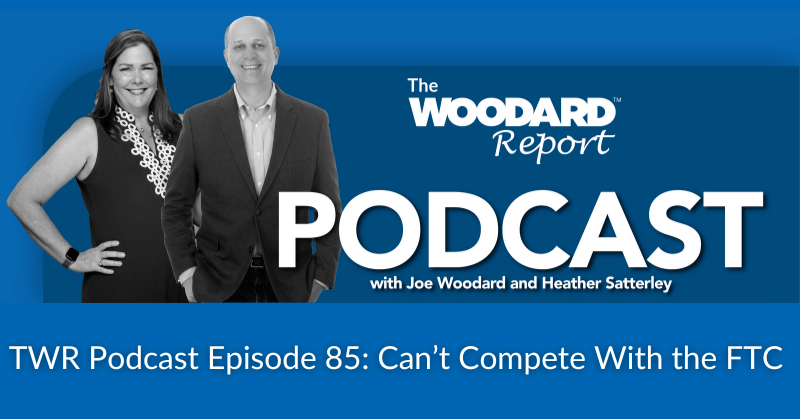In a special edition of The Woodard Report podcast, Joe Woodard and Heather Satterley discussed the significant implications of the Federal Trade Commission's (FTC) recent ban on noncompete agreements.
Disclaimer
It should be stressed that Woodard and Satterley are not HR experts or lawyers; their opinions expressed in this podcast are their own and should not be regarded as legal advice on the FTC’s noncompete ban. Rather, Woodard and Satterley’s takes on the subject should be regarded as those of journalists. We recommend contacting legal and/or compliance advisors to ensure compliance and help you decide what this new rule means for your business.
The FTC's ruling explained
On April 23, 2024, the FTC issued a ruling that imposes significant restrictions on employers' use of noncompete agreements, which has significant implications for employment contracts throughout the United States.
According to the FTC’s official press release on the matter, the ruling was put in place to “promote competition by protecting the fundamental freedom of workers to change jobs, increasing innovation, and fostering new business formation.”
The release also said that when the Commission first proposed the rule in January 2023, it received over 26,000 comments on the proposal, 25,000 of which expressed support for it.
The FTC defines a noncompete agreement as “a contractual provision that restricts a worker's ability to engage in competing employment or business activities after the termination of their current employment.” These agreements typically prohibit workers from joining or establishing competing businesses within a specified geographic area and time frame.
The new law affects businesses under U.S. jurisdiction but excludes nonprofits and organizations in geographical regions outside of the U.S., such as the United Kingdom.
Despite the outcry from figures in various industries—including insurance and real estate—pleading for exemptions, the ruling encompasses nearly all sectors, including accounting.
The FTC’s definition of a “worker”
Under the new rule, employers must provide notice to workers bound by an existing noncompete that they will not be enforcing any noncompetes against them.
Within the report, the FTC defined a worker as follows: “A natural person who works or who previously worked, whether paid or unpaid, without regard to the worker’s title or the worker’s status under any other State or Federal laws, including, but not limited to, whether the worker is an employee, independent contractor, extern, intern, volunteer, apprentice, or a sole proprietor who provides a service to a person.”
Exceptions to the ruling
While the FTC's ruling imposes broad restrictions on noncompete agreements, certain exceptions apply in specific circumstances. These exceptions include:
-
1. Senior Executives (a worker with a policy-making position who received an annual (or annualized) salary of at least $151,164 in the year preceding the worker’s departure)
-
2. Organizations outside the FTC’s Jurisdiction
-
3. Noncompete agreements entered into by ownerships AND workers as part of the sale of a business, provided they are reasonable in scope and duration.
-
4. Other types of restrictive agreements. This ruling does not impact the restrictive agreements listed below, provided that their use, separately or in combination, does not effectively represent a noncompete between the company and the worker:
-
a. Non-Disclosure Agreements (NDAs)
-
b. TRAPs (Training Repayment Agreement Provisions)
-
c. Non-Solicitation Agreements
-
d. Non-Recruitment Agreements
-
e. Garden Leave Agreements
-
f. Severance Agreements
-
According to the new rule, employers are banned from entering into or attempting to enforce any new noncompetes, even if they involve senior executives.
Alternatives to noncompetes
The commission also suggested alternatives to noncompetes that businesses could consider to protect their investments without noncompete agreements. For example, it suggested that non-disclosure agreements (NDAs) and trade secret laws could be used by employers with “well-established means to protect proprietary and other sensitive information.”
The statement also suggested that instead of relying on noncompetes to retain their talent, employers can “compete on the merits of the worker’s labor services by improving wages and working conditions.”
Criticism from within and without the commission
Representatives from multiple industries and FTC commissioners have criticized the ruling. The U.S. Chamber of Commerce (USCC) filed a lawsuit the same day that the FTC announced the new rule.
Of the lawsuit, USCC President and CEO Suzanne P. Clark said, “Since its inception over 100 years ago, the FTC has never been granted the constitutional and statutory authority to write its own competition rules…yet today, three unelected commissioners have unilaterally decided they have the authority to declare what’s a legitimate business decision and what’s not by moving to ban noncompete agreements in all sectors of the economy.”
Commissioners from the FTC also stated their dissent to the ruling on the record. Commissioner Andrew Ferguson dissented on the basis that the commission, as an administrative body─and not elected officials─does not have the authority to issue this ruling. He argued that a similar bill was introduced and rejected in Congress and that the ruling is unconstitutional and illegal. “Our Constitution assigns Congress the legislative power because Congress answers to the people for its choices. We are not a legislature; we are an administrative agency wielding only the power lawfully conferred on us by Congress. Americans cannot vote us out when we get it wrong.”
Commissioner Melissa Holyoak said, “threshold question must be answered for the Noncompete Clause Rule (“Final Rule”): Does the Commission have authority to promulgate legislative rules under Section 6(g) of the FTC Act? I believe the answer is no and therefore I respectfully dissent. Further, even assuming, arguendo, the Commission has such rulemaking authority, I believe there is no clear congressional authorization under Section 5 of the FTC Act for promulgation of the Final Rule and therefore agree with Commissioner Ferguson’s reasons for rejecting the Rule.”
Holyoak stressed that her dissent shouldn’t be interpreted as an endorsement of “all noncompete agreements” and that she “would support the Commission’s prosecution of anti-competitive noncompete agreements” if the law supported the FTC’s right to enforce such a rule. However, she said, the commission’s law states that such rights “must always be grounded in a valid grant of authority from Congress.”
Woodard and Satterley’s take on the ruling
Woodard and Satterley discussed the impact that the new ruling will have on workers and businesses of all sizes, weighing the pros and cons. For example, the two argued that noncompetes favor established businesses over entrepreneurs and can even hinder entrepreneurship. Woodard also suggested that with this new rule, small businesses may need additional protections.
Satterley pointed out potential loopholes and challenges that could arise from the ruling; for example, while nonprofits might generally be exempt, those that aim to enrich their members could still fall under the FTC's rule. There are also specific "carve-out" loopholes such as the allowance of noncompete clauses in the sale of businesses, which protect the buyer's investments.
The two agreed that while the intention behind the ruling—to prevent exploitation and encourage entrepreneurship—is commendable, the FTC's actual policy enactment might not be the appropriate path.
Satterley and Woodard suggested that such significant changes should ideally come through legislative processes involving elected representatives to ensure a balanced approach that considers the interests of both workers and business owners.
As the situation evolves, especially with ongoing legal challenges, we advise business owners to stay informed and seek legal guidance to navigate the new regulations effectively.
To hear to the discussion in greater detail, listen to the full podcast below and be sure to subscribe to The Woodard Report Podcast on Apple Podcasts, Spotify, Amazon Music, Stitcher, or Player FM so you don’t miss an episode!
.png?width=150&height=63&name=TWRlogo-regmark_blueblack%20(1).png)
.png)










Do you have questions about this article? Email us and let us know > info@woodard.com
Comments: